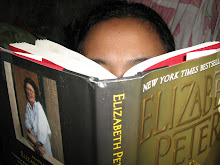When I was a bratty eleven-year-old first year high school student who thought she knew a lot about the world even at her young age, teacher evaluation time came around in our national high school. I don't know if this practice still prevails, but at that time, the students were given survey forms and asked to evaluate their teachers anonymously. Although the forms were the kind where you rated certain factors on a scale of one to ten, there was a space at the bottom where you could write "further comments and suggestions." Needless to say, all hell broke loose. It was the first time the students had ever been given that much power: to say what they thought of their teachers without fearing retribution. And we used it with a vengeance.
"Miss X always wears short skirts even though she does not have good legs." "Mrs. Y is boring. Why does she keep making us memorize those boring dates?" "Why do we need to learn math? Will the world end if we don't know the value of 3x + y? And the teacher teaching the subject is ugly, too." "Mr. D should lower his voice. He always startles me." "Mrs. G does not know how to iron her clothes correctly. Why does she come to class in wrinkled clothes? It's as wrinkled as the way she teaches."
Ah, the harshness of the young desperate to prove that despite their age, they knew something, thought something, should be applauded for something, should be lauded for pointing out the ills of society which they thought nobody else had noticed.
What we did not realize was that the teachers themselves were able to read the comments. Although they did not know who wrote which exact comment, they did know which class certain comments came from. Boy, did we not know what was in store for us that day that all our teachers marched into class carrying the survey sheets.
"Class, before we begin, I want to ask you something," Mrs. G began. She was the math teacher who got criticized for her looks and her clothes, and let's face it, math was definitely the least favorite subject in our class.
She held up a piece of white paper with a small inkblot on it.
"Can you tell me what this is, class?"
We all stared at her like she was crazy, and finally someone said, "That's an inkblot, ma'am." "Yeah, an inkblot," someone else chimed in. "That's an inkblot all right," everyone chorused.
"So it's an inkblot, class?"
"Yes, ma'am, what else could it be?"
"I have one more question for you, class. Why is it that you saw only the small inkblot and did not see the white paper?"
Total silence.
"Class," she said in a strong yet trembling voice, "your teachers are doing their best to give you an education. Sometimes you don't like your subjects, sometimes you think certain things are stupid, sometimes you even think your teachers are stupid. You are certainly free to question many things, but you forgot that everything is capable of being viewed in different ways. What if your teacher likes to wear short skirts because she can walk better in them? Do only people with good legs have the right to wear short skirts? If your teacher is ugly, does that reflect on her qualifications to teach you math? What if your teacher had to cook food and iron the clothes of her husband and children first, and had to leave off ironing her own clothes for last, so that she was not able to iron them at all because she would be late for class? Does that reflect on her knowledge of the subject she is trying to teach you? Class, I know you're one of the most intelligent classes I've ever taught in all my years in this school. But you forgot that your teachers are people, too. Why did you see only the inkblot, no matter how small, but did not even mention the white paper that was bigger?"
I am sure we all came home from school in a reflective mood that day. I certainly did. Why did we see the inkblot, and not the paper? Why did we take pains to detail all the things that we didn't like about our teachers, and did not ever mention anything positive? Perhaps it was because the paper was a given. It was there in the background; it went without saying. Perhaps it was because we thought the teachers were already too full of their power and their supposed infallibility as teachers, and they needed to be taken down a notch. (Most of us did hold the attitude that teachers and authority figures were not to be questioned or doubted, although my teachers would later tell me that that was not true of me, as I was their enfant terrible and some of them lived in fear that I would blurt out something they could not answer and put them to shame.) Perhaps we thought that there had already been a lot of positive things said about our teachers and that nobody had ever bothered to point out that there were things about them that were not so positive. We did forget one thing, as Mrs. G said: Everything can be viewed in many different ways. As with the donut and the hole, it depends on how you look at it. To dwell on just one aspect of it, however, would not be fair to the others, especially if you magnify it to the point that it is made to appear the sum total of the thing. If you see only the inkblot, what about the paper?
Also, she said, teachers are people, too. People should be treated with basic courtesy, with respect for what we call their human dignity. As there are always different ways to view things, so too are there different ways to state things: some offensively, others courteously but no less firmly. I realized that she was trying to tell us that although you may not agree with someone, although you may question someone, you should always keep in mind that he/she is also a person, that you can express that disagreement and doubt in a manner that is courteous without being less forceful. That you can argue with or criticize someone without calling them names.
"Class, most of all," Mrs. G said that day, "it would really help if you offered a solution to something if you must criticize it! Why criticize it, especially that harshly, if you cannot help the matter? You're only adding to the problem, not solving it." Well, yes. Although I might not agree fully with offering criticism only if you have a solution to propose, bashing really doesn't help, it just makes matters worse. Oftentimes bashing just serves to show off what a person thinks he or she knows, instead of correcting the problem. Instead of just pointing out the inkblot and making much of it, why not offer ways to erase it or turn it into something good?
----
Mrs. G, you know who you are. See, I never forgot your lesson. Thank you, Ma'am.
Five Dramas That Are My Equivalent Of Comfort Food, Part 2
-
So, yes, well. I've added to my "comfort dramas" list in the meantime. You
know which ones I'm referring to... the dramas you tend to go back and
rewatch w...
12 years ago











